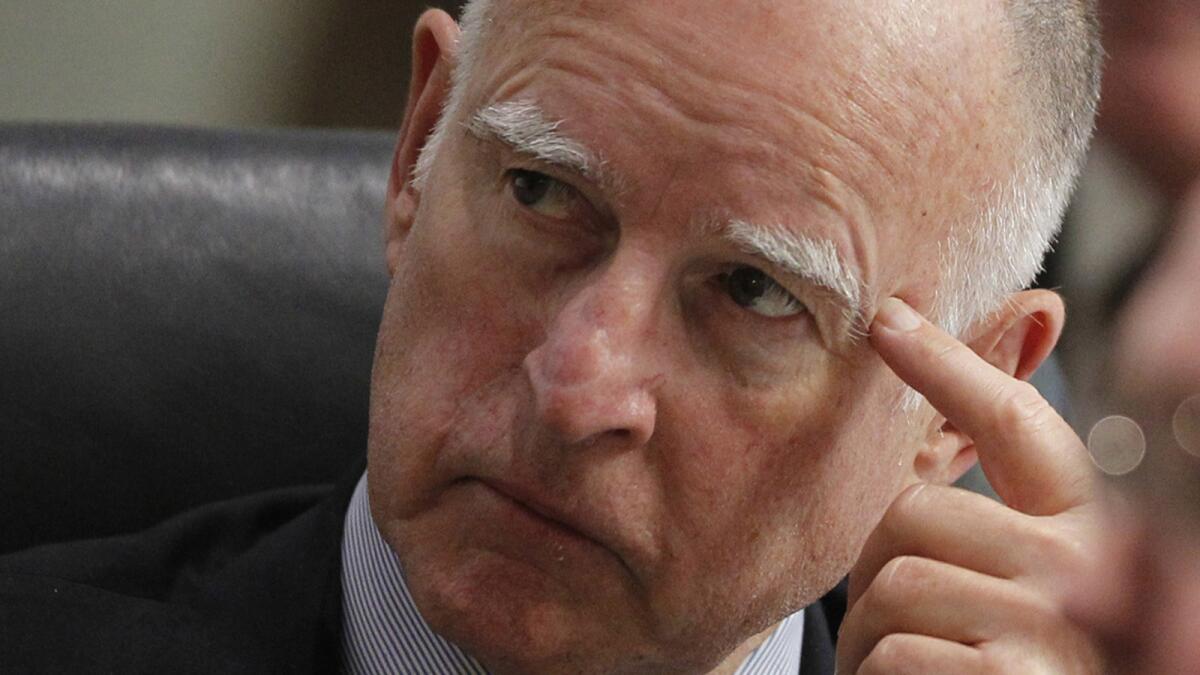Man’s pardon withdrawn after Times discloses financial regulators’ censure

Gov. Jerry Brown withdrew a Christmas Eve pardon Wednesday after learning from the Los Angeles Times that he was granting clemency to a man recently disciplined by financial regulators.
Glen Williams Carnes, one of 105 people who received an executive pardon from the governor, had been cited for having “lived an honest and upright life, exhibited good moral character and conducted himself as a law-abiding citizen.”
His pardon was for a 1998 conviction of possession for sale of a controlled substance, for which he spent three years on probation in Orange County. Others were given clemency for crimes involving drugs, robbery and burglary and, in one case, solicitation of murder.
In the Christmas Eve pardon, Brown said Carnes had “paid his debt to society and earned a full and unconditional pardon.”
That changed later Wednesday afternoon when The Times informed the governor’s office that federal records show Carnes was disciplined by investment regulators in May 2013. He signed a consent settlement with the Financial Industry Regulatory Authority in which he agreed to be barred from association with financial investment advisors. The document alleged Carnes hid an outside business deal and provided investigators with “false and misleading statements that minimized and mischaracterized his involvement.” Carnes did not admit guilt.
Brown’s office said it was unaware of the disciplinary action, and had relied on Carnes’ August 2013 certificate of rehabilitation from Orange County Superior Court.
“This information was not disclosed by the applicant,” Brown’s spokesman, Evan Westrup, said in a written response to The Times. “Without the certificate of rehabilitation, this individual would not have been considered for a pardon. This particular pardon has not yet been attested by the secretary of state and it has subsequently been withdrawn.”
Carnes did not return a message left at his Irvine business office. A woman who answered the phone at the company’s office said Carnes was at church Wednesday afternoon and would call back later.
Others receiving pardons include Anong Baker, a woman who spent four years in prison for soliciting a murder in Merced County and was released in 1996.
The majority of those granted pardons, however, committed drug-related offenses that are no longer felonies in California.
Carlisle Wallace has served in the Marine Corps for the last 18 years as an avionics technician.
Twenty years ago, Wallace was convicted of receiving stolen property — “absolutely dumb stuff” he and his friends lifted near Santee, he said. After nine months in jail, Wallace said he petitioned a judge to lift his probation so that he could join the Marines. He has been working on aircraft ever since — in Japan, North Carolina and Texas.
The 39-year-old father of two, now stationed near Ft. Worth, says he considers the governor’s action validation that he has turned his life around.
“I’m in the Marine Corps, serving my country. I’m nothing like that 20-year-old coming out of jail,” Wallace said.
Brown’s latest round of pardons, excluding Carnes, brings his tenure total to 509. The three governors before him — Arnold Schwarzenegger, Gray Davis and Pete Wilson — awarded a combined 29 pardons over 20 years, but Ronald Reagan granted clemency to 574 offenders.
It is a largely secretive process. The governor’s office typically sends pardon applications to the Board of Parole Hearings for investigation, and the findings are returned to the governor’s office for a decision. Brown’s office refuses to release those files, contending they are shielded from the state public records law.
“Each case is assessed individually on its own merit and pardons were granted only to those who demonstrated exemplary behavior and lived productive, law-abiding lives following their conviction,” Westrup said early Wednesday.
But in Carnes’ case, he said later, Brown’s office relied solely on his court certificate of rehabilitation.
Another man who received a pardon called the vetting by the governor’s office “exhausting.”
“It’s an investigation into your life, right down to your bank accounts,” said the man, who asked not to be identified because he did not want his past criminal conviction known. “They investigate you completely all over again … so they can make sure there’s nothing hidden there.”
In Carnes’ case, Securities and Exchange Commission records show the business deal that led to the sanction created what is now Carnes’ company: Global Vision Holdings, a publicly traded corporate umbrella that lists Carnes as chief executive, chairman of the board and chief financial officer. The company has not made a detailed financial filing since November 2013.
California voters in November passed Proposition 47, a speedier alternative to the pardon process. The ballot measure converts felony drug possession and minor theft charges to misdemeanors. Those with past offenses have three years to apply to local courts to have those felonies removed from their records.
Times staff writers Melanie Mason and Phil Willon contributed to this report.
More to Read
Start your day right
Sign up for Essential California for news, features and recommendations from the L.A. Times and beyond in your inbox six days a week.
You may occasionally receive promotional content from the Los Angeles Times.





